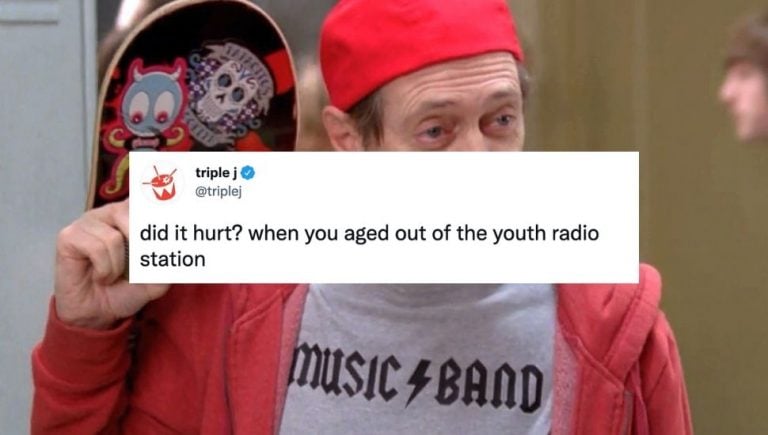Youth broadcaster triple j opened up a Pandora’s Box yesterday with the relatively innocuous tweet, “did it hurt? when you aged out of the youth radio station.”
did it hurt? when you aged out of the youth radio station
— triple j (@triplej) August 31, 2021
The tweet was a patent sly dig at the audiences who have aged out of the radio station’s target demographic. Y’know, a response to all the old heads that flood the comment sections of every Spacey Jane article with the time-honored “remember when you played REAL MUSIC like REGURGITATOR and MAGIC DIRT” spiel.
Unfortunately for the j’s (but fortunately for my evening timeline entertainment), it incited a maelstrom of conversation surrounding ageism within the Australian music industry.
As a female artist who stopped getting played on rotation when I hit my 30s, I finally feel seen 😉 https://t.co/fVuzkMzd7f
Love Music?
Get your daily dose of metal, rock, indie, pop, and everything else in between.
— Ainslie Wills (@ainsliewills) August 31, 2021
Thanks Triple J, the “Maybe your sound would be better suited to Double J” email was so great at 25. played once on the main station since then 😉 https://t.co/RICCBOyOkU
— Jack Colwell (@jackcolwell_) August 31, 2021
Ageism, a weird, sticky quagmire, one that has been kept relatively hush-hush. I get it, when we’re already fighting tooth and nail for cultural and gender diversity in Australian music, attempting to combat the age thing feels overwhelming.
Poppy Reid diagnosed it succinctly in this The Industry Observer piece:
“This music industry has seen the symbolic annihilation of women over 40. They have been aged out of the industry in a way that is so subversive that not only are we losing incredible music (and therefore economic contributions), but we’re also sounding warning bells to emerging acts.”
It’s an issue that has been addressed by household names like Tina Arena, and Kylie Minogue. Though the ramifications of ageism that impact the industry at a more grassroots level remain… relatively unspoken. Until yesterday’s Twitter blitzkrieg that is…
This is bad enough as a jab at the listeners, but the bit that makes this all the more sadistic is that many 30yo+ (particularly non male) artists who are making the best work of their careers are shuffled straight to Double J (1/3) https://t.co/OdOJ6ZOKX1
— Jono Steer (@jonosteer) August 31, 2021
The youth audience deserves more respect than this and will appreciate good music made by anyone. The dumbing down of content like this is creating more of a shift in your listeners than aging is. Get with the times @triplej (3/3)
— Jono Steer (@jonosteer) August 31, 2021
Incredibly ageist. Did it hurt when the original poster aged out of abc’s ethical values? https://t.co/a8QxNjvVf7
— Charlotte Abroms (@charlotteabroms) August 31, 2021
Who is in charge of this account, and what colossal error of judgement led to this? As a 41 year old member of the local, grassroots music scene, I take umbrage to this disrespectful ageism. Ironic that an organisation with such strong egalitarian values could be so tone deaf…
— Marshall Thomson (@marsh_e79) August 31, 2021
Some Twitter users took to implying that triple j-core artists have resorted to lying about their age to survive the industry.
At least one major artist made by JJJ in the past couple of years is significantly lying about their age hahahahaha
— Tony Shalhoub Memes Founder (@maximumcuddles) August 31, 2021
Whilst others just straight-up took to pointing out triple j Music Director Richard Kingsmill’s age.
WHADDUP KIDS my name is Richard! ;) you can call me the KING though ahah :P https://t.co/4pBAV7DtVR pic.twitter.com/uHB9c4pISH
— parry (@oldmatepazz) August 31, 2021
Is this a Richard Kingsmill subtweet?
— Ben Harris-Roxas (@ben_hr) August 31, 2021
dunno, ask Richard Kingsmill
— Burdak of Meteorology 🌦️ (@Tezamondo) August 31, 2021


































